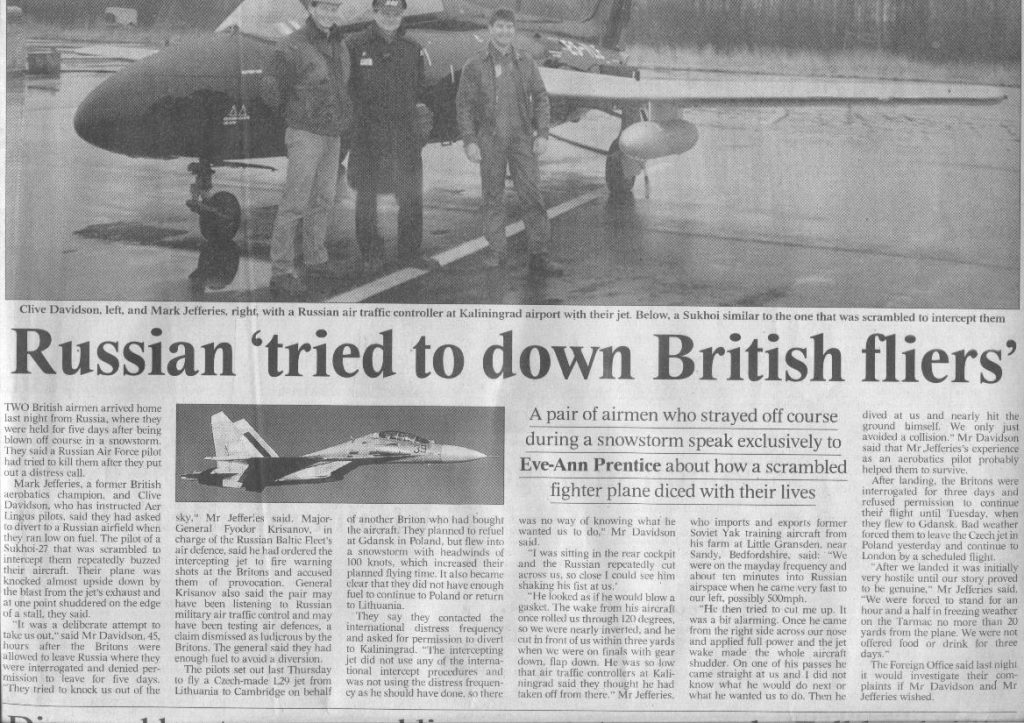Report in the Times news paper of the 6th March 1999 “Fast fun in Saddam’s avenger“
Sukhoi 27 Interception, reproduced by kind permission of The Times, London, 15th January 1998
and this is what the “other” side have to say.
MAY DAY OF THE BLACK DELFIN by the Russian publication “Aerospace Herald”
MAYDAY OF THE BLACK DELFIN
On the 15th of January of this year an L-29 Delfin jet trainer, flown by two English pilots, violated the State border of Russia.
“They had made a mistake in their calculations and were saving their own lives” (by taking the action they did) was how it was confirmed by representatives of the “competent organs” who had conducted an investigation into the affair.
However, officers of the Air Defence Forces and pilots of the Baltic Fleet Air Force who had intercepted the “stray bird” stated that the behaviour of the pilots in the air, the flight itself over our territory and the subsequent explanations led one to the belief that their actions were premeditated.
“The aircraft carried only the normal standard equipment and there could be no question of it being on an espionage mission. The fuel remainder was only 350 kg and the weather conditions would not have allowed the crew to reach Gdansk” declared representatives of the Federal Security Service (the F.S.B.).
But 350 kg is almost a third of the normal fuel capacity of the L-29 when fitted with under-wing fuel tanks. Any aviator would know this. With such a fuel remainder it would have been possible to reach either Gdansk or to have returned to Lithuania, even in the most unfavourable weather conditions. Also, the absence of “specific equipment” does not exclude the possibility of something up the sleeve.
“If someone wants to be a hero, that’s their problem, but we have enough of our own troubles.” was how it was brushed aside by the authorities in response to tiresome journalists.
We don’t want to argue on the topic of “other troubles”. But we would like to talk in a little more detail about heroes. However, direct participants in the incident (on the Russian side, of course) do not regard themselves as heroes. “We were simply carrying out our assigned task” they said.
This “simply carrying out the task”, however, was regarded highly by the Russian Minister of Defence. On the 23rd of January he issued an order for an incentive award to be made to the military personnel who had distinguished themselves most in carrying out this task.
The Minister awarded “valuable gifts” (often this can be cash or a watch etc..) for the high professional training and readiness, decisive actions and skilful leadership of their duty personnel, to the Deputy Commander of the Baltic Fleet Fighter Regiment Lt Col V. Shekurov, the Duty Alert Officer of the Fighter Regiment Command Post, Major Vadim Trushevskii, Flight Commander Captain A. Olejnik and Head of the Regional Air Defence Forces Radar Unit of the Radio Technical Regiment, Snr Lt S. Brachkus.
In this same Order gratitude was expressed to the following officers; A. Anokhin, A. Degtarev, V. Mironenko, A. Balakal’chuk, A. Bojkov, A. Murenko, O. Ivanov, G. Belyaev and V. Trushevski as well as to Senior Ratings P. Bekshinaya and E. Berezovskaya.
The list, it has to be said, is incomplete. It is surprising that several directly involved participants in the intercept do not figure in it. Thus, for example, there is no mention of the name of Guards Major Vladimir Boldov. After all, it was he, specifically, who directed the fighter of Andrej Olejnik onto the target. The Regiment Commander, Guards Col Alexander Bojkov directed the second crew on to the target. This crew, by the way, consisted of two pilots: the Su-27UB was flown by Deputy Regimental Commander Guards Lt Col Valerij Shekurov and Squadron Commander Guards Lt Col Sergei Nesynov, who seem to have been forgotten for some reason. Not within the Baltic Fleet Air force, but at a somewhat higher level. Shekurov and Nesynov are both First Class Pilots and to say that Sergei Vital’evitch took part in the intercept as a passenger is absurd.
The assertion that the English pilots who were flying the ill-fated Delfin were thinking only of getting the aircraft onto the ground as soon as possible at best raises a sceptical smile. From a distance of about twenty metres or so it was plainly obvious how the crew of the L-29 were reacting with gestures to signals from the Su-27, but were not obeying its orders. Only after the words “Prepare for a warning shot from the cannon” were heard over the ether did the black painted aircraft descend sharply. The impression gained was as if the crew had monitored the radio exchanges between our pilots and the ground controllers. The landing at Khrabrovo (Kaliningrad-Khrabrovo), by the way, was accomplished expertly from a straight in approach.
“Pilots in distress do not conduct themselves in such a way” said the Baltic Fleet pilots. Actually, the Delfin had spent more than forty minutes in the air over Russian territory, but apart from giving out the Mayday distress call nothing else was done to resolve the situation. No one explained precisely the absence (sic) of identification markings on the aircraft and references to inexperience (of the crew) would be excusable for novice private pilots, but not in any sense for professional military (sic) pilots. It is possible to allow that the transgressing pilots had previously not had occasion to fly the L-29, but how this would influence their loss of orientation……
The uneconomical speed of 200 kph chosen by the English pilots is better explained not because of inexperience, but rather in anticipation of being intercepted and by knowledge of the (low speed) limitations of Russian fighters. The Su-27P with a full weapon load cannot escort such a slow flying aircraft. It is possible that there was a calculated (plan) to seize the moment and dash across the border. Also not excluded is the fact that it was just simple provocation- to put the Russian pilot into a critical flight regime where he would suddenly enter a spin!
Although the voice warning system of the Su-27UB warned the crew every twenty seconds of their critical flight parameters, Shekurov and Nesynov nevertheless compelled the English pilots to obey their orders. That is why they left them in peace. When they got back home, however, the English pilots spoke to the Times newspaper about the almost premeditated attempt to bring them down at the time when they were in distress over the Kaliningrad Region. They explained their change of flight route to their compatriots by saying that they were running short of fuel and that they were flying in a snowstorm. In their words the intercepting Su-27 started to carry out manoeuvres around them which almost ended up killing the Englishmen.
All of these complaints were repudiated by the Baltic Fleet pilots during a meeting with journalists. The Press were given not only official information from the Hydro-meteorological Service about the actual weather conditions on that day and at the actual time in question (there was no snowstorm and hurricane strength winds), but they were also allowed to listen to the taped recordings of the radio exchanges between the pilots and the ground during the intercept.
Guards Lt Col Valerij Shekurov spoke about the strict observance of all the essential procedures when carrying out the intercept. The interceptors maintained a safe distance from the target. Approaching from the starboard side, they made certain that the crew of the violating aircraft could see them. Then, rocking their wings to signal that “You are violating our airspace” they broke right to indicate “Follow me”. They approached for a second time and a third… They also used hand gestures to show that they were to follow the fighter. The violators confirmed by hand gestures that they were ready to land and even extended their air brakes and reduced speed. However, this was only a feint.
Certainly two Mayday calls were heard over the radio, but the first call was only made after the approach of the Russian fighter and the second was pronounced in an off-hand sort of way as if to say “Go away, leave us alone”. In this type of situation any pilot in distress should have been shouting over the radio about their low fuel state from the border itself and requesting a landing at the nearest airfield. So, the aircraft was classified as a violator in accordance with the requirements of the Russian Air Codex. It had crossed the border without appropriate authorisation. It did not have any national identification marks (sic). Its non-standard colour scheme conjured up all kinds of associations. So, what was a pilot to think, “what kind of “goose” is this that has flown in?”
If the violator had slipped away it would have been another slap in the face for our country. If it had been brought down, (there are at least two ways of doing this without the use of weapons), there would have been an international scandal. The crew of the two-seater and also the fighter controller directing the intercept acted wisely, without committing any errors and having selected the only correct solution. Today, no one has the slightest reason to reproach our country. Perhaps there is some reasonable basis for not blowing this story out of proportion, but wouldn’t a general pardon lead to the appearance of new ‘Matthias Rusts’? Military aviation exists to stop not only aggression, but also any attempt to violate state sovereignty. In this sense, everyone who took part in the intercept of the black Delfin acted correctly and decisively.
****
The author of this article was VLADIMIR SUL’ZHENKO who also took the photos which accompany his text.
The magazine from which the article was taken is VESTNIK AVIATSII i KOSMONAVTIKI – AEROSPACE HERALD Issue No. 4/98 (July – August 1998).
The Editor is SERGEI SKRYNNIKOV and the Editorial Address is:-
AEROSPACE HERALD, ROSSIYA/RUSSIA, 125871, MOSCOW, Volokolamskoe Shosse, Dom 4,
Tel/Fax (095) 195-9470 and 943-8780, Annual subscription $60 USD, Email:- vak@mai.ru

